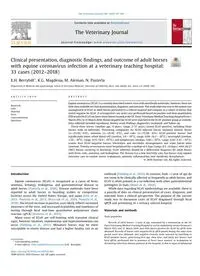
2019 Clinical presentation, diagnostic findings, and outcome of adult horses with equine coronavirus infection at a vete PDF
Preview 2019 Clinical presentation, diagnostic findings, and outcome of adult horses with equine coronavirus infection at a vete
Clinical presentation, diagnostic findings, and outcome of adult horses with equine coronavirus infection at a veterinary teaching hospital: 33 cases (2012–2018) E.H. Berryhill*, K.G. Magdesia, M. Aleman, N. Pusterla Department of Medicine and Epidemiology, School of Veterinary Medicine, University of California, Davis, One Shields Ave., Davis, CA, 95616, USA A R T I C L E I N F O Keywords: Colic Diarrhea Fever Gastrointestinal Infectious A B S T R A C T Equine coronavirus (ECoV) is a recently described enteric virus with worldwide outbreaks; however, there are little data available on clinical presentation, diagnosis, and outcome. The study objective was to document case management of ECoV in adult horses presented to a referral hospital and compare to a cohort of horses that tested negative for ECoV. A retrospective case series was performed based on positive real-time quantitative PCR results for ECoV on faeces from horses treated at the UC Davis Veterinary Medical Teaching Hospital from 1 March 2012 to 31 March 2018. Horses negative for ECoV were matched to the ECoV-positive group as controls. Data collected included signalment, history, exam findings, diagnostics, treatment, and follow-up. Thirty-three horses (median age, 11 years; range, 2–37 years) tested ECoV-positive, including three horses with co-infections. Presenting complaints for ECoV-infected horses included historic fevers (n = 25/30; 83%), anorexia (n = 14/30; 47%), and colic (n = 13/30; 43%). ECoV-positive horses had significantly lower white blood cell (median, 3.0 � 109/L; range, 0.68–16.2 � 109/L), neutrophil (median, 1.26 � 109/L; range, 0.15–14.4 �109/L), and lymphocyte (median, 0.86 � 109/L; range, 0.42–3.47 � 109/L) counts than ECoV-negative horses. Electrolyte and metabolic derangements and scant faeces were common. Twenty-seven horses were hospitalised for a median of 5 days (range, 0.5–14 days), with 26/27 (96%) horses surviving to discharge. ECoV infection should be a differential diagnosis for adult horses with fever, colic, anorexia, and leukopenia. The disease has a low mortality rate, but horses may require intensive care to resolve severe leukopenia, systemic inflammation, and metabolic disturbances. © 2019 Elsevier Ltd. All rights reserved. Introduction Equine coronavirus (ECoV) is recognised as a cause of fever, anorexia, lethargy, leukopenia, and gastrointestinal disease in adult horses (Pusterla et al., 2018). Disease outbreaks have been reported in adult horses in boarding stables or competitive facilities across the United States, Europe, and Japan (Oue et al., 2013; Pusterla et al., 2013; Miszczak et al., 2014; Pusterla et al., 2018). The recent increase in positive cases likely reflects increased awareness of the virus, and increased availability and timeliness of testing through fecal real-time quantitative polymerase chain reaction (qPCR) (Pusterla et al., 2013). Many cases of ECoV are self-limiting with transient clinical signs, however fatalities, endotoxemia and hyperammonemia can occur (Fielding et al., 2015). Miniature horses may be more susceptible to severe disease and had a higher fatality rate in an outbreak (Fielding et al., 2015). In contrast, foals <1 year of age do not seem to be clinically affected as frequently as adult horses, and ECoV is often present as a co-infection with other gastrointestinal pathogens in foals (Slovis et al., 2014). While data regarding ECoV epidemiology are available, there is a paucity of data on clinical presentation of cases, diagnosis, and outcome from a clinical perspective. The purpose of the current study was to document cases of ECoV diagnosed through fecal qPCR and presenting to a tertiary referral hospital. Materials and methods Study population Records of adult horses >1 year of age, examined by a veterinarian at the UC Davis Veterinary Medical Teaching Hospital or on the ambulatory service between 1 March 2012 and 31 March 2018, and with faeces positive for ECoV by qPCR were obtained. Records of horses with negative fecal qPCR panels during the same time period were also obtained, and negative controls were selected by matching to ECoV-positive horses, prioritising first age, then time, and lastly sex. Horses had fecal qPCRs performed due to presence of fever, loose manure, or leukopenia as dictated by infectious disease protocol at the hospital, or due to signs of abdominal * Corresponding author. E-mail address:
